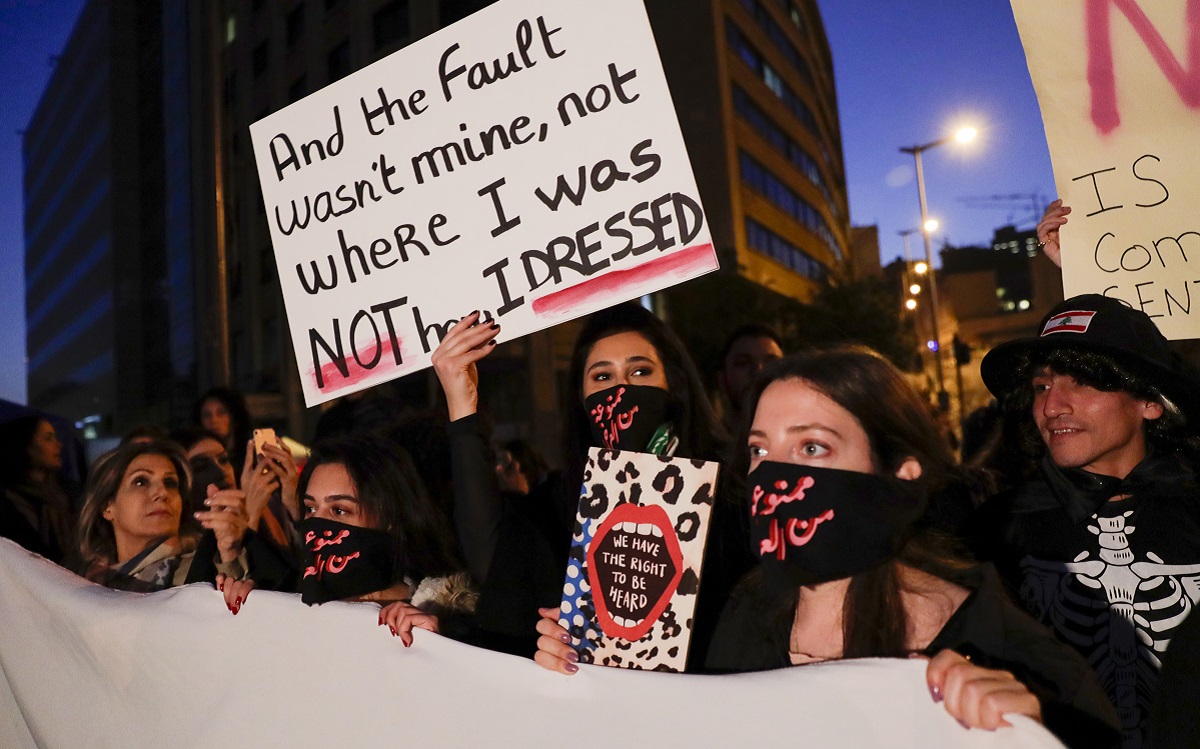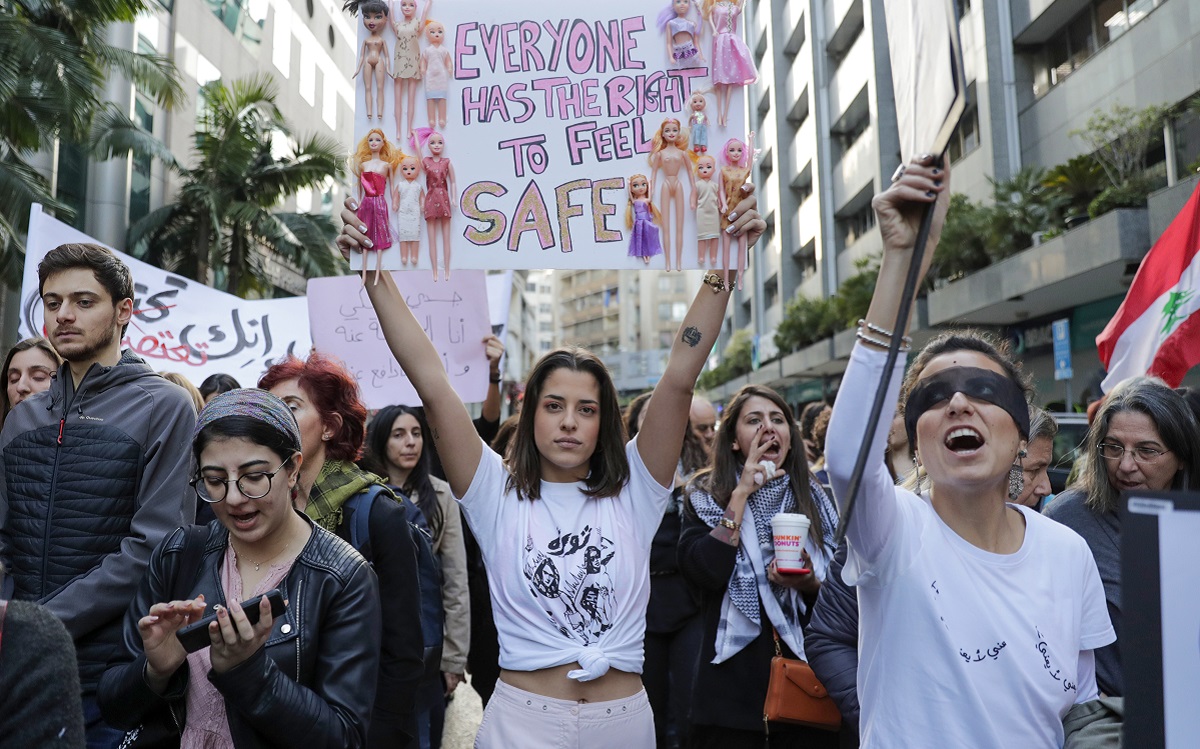
Marya Latif reported Marwan Habib, a man she had met briefly in a restaurant in Hamra, for allegedly harassing her with messages where he would ask her to sleep with him.
It was in the midst of the October 17 uprising, when Lebanese social media was most active, that she decided to make her story known and published her experience on Twitter so that other women could be on the lookout.
Over 50 women responded, sharing their harassment stories, accusing the same man of alleged harassment, assault and rape.
Habib was briefly detained, but then released. He filed a lawsuit against Latif, accusing her of cyberbullying and defamation, ultimately forcing her to apologize on Twitter and say that it was all a “misunderstanding”.
Despite Latif being forced to apologize, dozens of women continued to expose his behavior.
The story continued.
Nagham Abouzeid, a student active in the October 17 movement, was another woman who exposed Habib. In the summer of 2020, Habib followed and cornered her in a parking lot in the northern city of Jbeil. She recognized him from all of the social media posts about him and knew that she needed to get away from him.
“I ran away unharmed,” Abouzeid said in a tweet describing the incident. “But the extent of damage this man has caused to at least a hundred women and the fact that Lebanese authorities knew and let him roam free is horrifying.”
This all came to a head last week when Habib was arrested by Miami Beach police in Florida on January 7 after breaking into a woman’s room and assaulting her. He appeared in court on January 7 and was charged with burglary, assault and battery and pleaded not guilty. He was denied bail during trial and his next hearing was set for January 27.
The case has made headlines in Lebanon and has triggered a storm of messages and testimonies on social media, with women, including harassment victims, celebrating his arrest. However, the story exposes the gaps in Lebanese law enforcement and legislation when it comes to investigating and prosecuting sexual harassment and assault, as well as the vulnerability of the justice system to political interference. With the exception of one harassment case brought forward by several Lebanese women last year, the new law has been so far ink on paper.
Pressure on the victims
Karim Nammour, a lawyer and board member at the Legal Agenda, says that most cases of harassment and sexual assault never even reach a prosecutor’s desk due to the many shortcomings in the sexual harassment law that Lebanon’s parliament passed in December 2020.
“For instance, it doesn’t really remove the burden of proof on the survivors who still need to prove that it actually happened, who still need to prove that there was some kind of intention or criminal intent which is very weird for a criminal law,” he explained.
When the sexual harassment law was passed in Lebanon, those involved in creating the bill heralded it as major progress for a country that has often made women second-class citizens.
The law saw steep fines, up to around 20 times more than that 675,000 lira average monthly minimum wage, against the perpetrators and jail time up to four years depending on the nature of the harassment.
While proponents of the law hoped that this would serve as a deterrent for would-be harassers, Nammour says that there are serious flaws with the law, starting with how it defines “harassment”.
“Judges cannot just bring their own interpretations without being influenced by social context, without being influenced by social culture, contextual culture, etc,” Nammour explained. “They used terms like ‘bad behavior’ and ‘bad behavior’ is not necessarily an objective term. It’s very subjective and it can be interpreted according to the context and it can be used against the survivor and not to help the survivor.”
Nammour used child marriage as an example. In an area where this is still common, if a case is brought before a judge, this would not be considered as “bad” behavior since, in the area, it is common practice.
Even the fact that abusers can only be tried in a criminal proceeding rather than giving the survivor the option of bringing forward a civil suit baffles Nammour.
“Why is this a problem: because when you only give one option, which is the criminal court and everything that it entails in terms of procedure, in terms of going to the instruction judge, to the police station, to the fact that arrests and jail time would ultimately be the punishment, may actually be a deterrent for survivors to actually file a lawsuit, especially when we are speaking about harassment cases that happen in the workplace.”
If harassment happens in the workplace, by going through a criminal procedure, it could affect their jobs, even forcing them to eventually resign given the potential blowback that a lawsuit could bring them.
However, Nammour is not advocating for removing criminal prosecution from the law but, rather, is arguing that giving survivors the option to try the case as a civil one in addition to filing a criminal case would give survivors more control over how they would like to go about getting justice.
In addition to this, a criminal lawsuit can be filed without the consent of the survivor, meaning, that if someone witnesses sexual harassment and reports it, a case is opened whether or not the actual survivor of the harassment actually wants to file a complaint.
“This is very problematic because a huge part with actually surviving sexual harassment is to own the case,” Nammour stated. “To own the lawsuit. To have some sort of ownership over it. And the legislature did not give this at all to survivors because they imposed a criminal lawsuit and they imposed it regardless of whether or not the survivor actually wants to file the lawsuit themselves.”

Proof of criminal intent
In most countries, when prosecuting cases involving sexual harassment and assault, the burden of proof for the plaintiff is often lessened and puts more emphasis on the need for the accused to prove that the harassment did not occur.
Lebanon is not one of these countries.
In Lebanon, individuals who bring forward cases of sexual harassment need to prove that the harassment did actually occur. The problem with this is that harassment is not always recorded, like repeatedly making unwanted advances on social media, and can be more of a “he said, she said” scenario.
“I’ve worked on sexual harassment for more than a decade and the biggest obstacle to sexual harassment cases is the proof,” Nammour said. “[Lebanon’s parliament] resorted to classical forms of truth procedures whereby the plaintiff needs to prove not only the material act but also, according to the way that the law is written, the criminal intent which is close to impossible. You can’t really prove criminal intent.”
Even if the law were to be amended, there would still be one fatal issue that would allow for perpetrators of harassment to avoid facing any consequences: political interference.
A dependent judiciary
The case of Marwan Habib is not the first when abusers and harassers have been able to use their political connections in order to avoid facing any consequences for their actions.
High-profile Lebanese priest Mansour Labaki was sentenced in France for child abuse but was never arrested or faced any challenges in court in Lebanon, where he currently resigns.
Wealthy and high-profile individuals also often receive lenient sentences or, in some cases, face no consequences at all.
If they have ties to political circles, then, like Labaki and Habib, then their cases may not even reach the courts.
“The problem with political interference in Lebanon is that it is endemic to everything,” Gino Raidy, a 31-year-old activist who has been outspoken on political corruption in Lebanon and is also monitoring the case against Habib, told NOW.
“In a country where judges are chosen by elected officials and their budgets are also set by those same officials, it’s not a surprise that a lot of judges will listen to a WhatsApp call from their patron or someone they want to garner favor with.”
Raidy was quick to point out that the refusal to prosecute Habib and allow him to move to Miami was not only an affront to justice, but also allowed a potentially dangerous man to roam freely in another country where he could continue harassing women.
In a country where judges are chosen by elected officials and their budgets are also set by those same officials, it’s not a surprise that a lot of judges will listen to a WhatsApp call from their patron or someone they want to garner favor with.
“It says a lot for Marwan Habib that when you don’t face consequences for the crimes that you do, you tend to always think that you can get away with it,” Raidy said. “And the reckless abandon and the audacious way that he just tried to con hotel staff and just going in and sexually assaulting a woman he had just bumped into earlier that same day goes to show that, in his mind, no matter what he does, because of his experience in Lebanon, he will never be held accountable.”
Both Raidy and Nammour noted how it is not just with cases of sexual harassment and assault that perpetrators are able to escape justice through political connections as political interference is endemic in Lebanon’s judiciary.
“In the most sensitive cases, we’ve seen, like with the Mansour Labaki case, we’ve certainly seen this with the Marwan Habib case but we’ve also seen this in any case related to corruption,” Nammour stated, mentioning that the Beirut Blast investigation has also been another victim of political interference. “Political interference is one of the main obstacles towards an independent judiciary in Lebanon.”
There have been attempts to ensure that the judiciary remains independent and devoid of political interference.
In 2020, the Legal Agenda submitted a draft law to Parliament which would establish an independent judiciary in Lebanon. However, it went nowhere with parliament refusing to even study the law much less vote on it.
Without any changes to Lebanon’s sexual harassment law and as long as Lebanon’s judiciary continues to suffer from interference by the country’s politicians, Nammour believes that the current “law will remain most probably ink on paper,” allowing harassers to run free while their victims are left without justice.
Nicholas Frakes is a multimedia journalist with @NOW_leb. He tweets @nicfrakesjourno.








